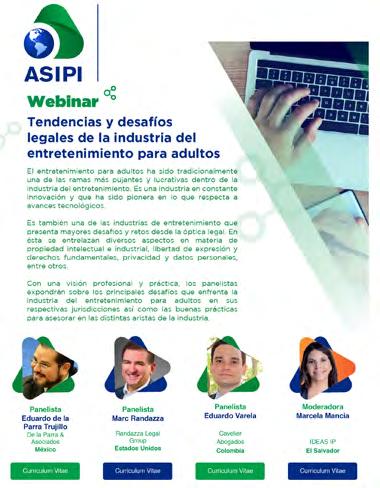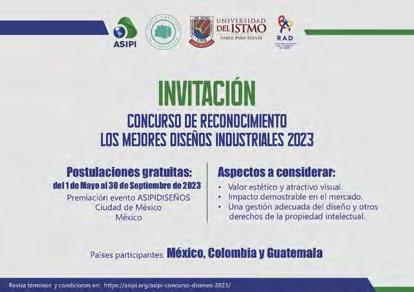
5 minute read
SPACE FOR COMMITTEES, PROGRAMS AND COMMISSIONS
by MundoASIPI
Administration Of Law Firms Committee
Working towards better management and direction of intellectual property law firms
The Administration of Law Firms Committee led the second edition of the webinar on “Trends in Compensation and Benefit Schemes in the Legal Services Market: How to Improve Employee Value Proposition?” This event took place in collaboration with the Colombian consulting firm Human Capital on March 30, 2023. During this insightful forum, we explored several trends and conducted statistical analyses across the following important areas:
(i) Work environments: A significant trend observed is the increasing preference for permanent remote work arrangements.
(ii) Management models: There is a clear inclination towards innovative leadership approaches characterized by agile structures and strategies focused on achieving results.
(iii) Compensation schemes: An optimal approach involves implementing a formula that combines a fixed salary with flexible payment options, variable incentives, benefits, and emotional rewards.
Regarding this last point, according to the salary and human resources management trends survey conducted by Total Rewards for 2023, eight out of nine organizations will focus their efforts on strengthening emotional salary. This is in response to the current reevaluation of labor priorities, where the focus should be on the well-being of workers and their experience within a culture of organizational happiness.
This is demonstrated by the latest statistics, for example, in the Colombian case, when reviewing what potential employees seek in a value proposition, the key elements are (in this order): quality of life, temporal and spatial flexibility, salary, projection and development opportunities, meaningful work, and training.

Our purpose is to provide law firms with tools to achieve improvements in their management, so we invite all members of ASIPI to share with this Committee any issues they would like to see addressed during 2023.


ANTI-COUNTERFEITING COMMITTEE
In full swing
TThe projects of the Anti-counterfeiting Committee are moving forward steadily, and together with Arturo I. González and colleagues, we have the great task of completing the digital book on counterfeiting and piracy in Latin America.
The webinars that have been promoted and successfully scheduled by the committee have generated great interest among members and additional audiences. This has been made possible by the dedicated work of Laura Plavnick, while the podcasts have been impeccably produced by the working group led by Gonzalo Luzuriaga.

In addition, José Alejandro Santana led the work related to ASIPI Writes, and committee members wrote articles on various topics, which are now part of the association’s digital library.

We would like to express our gratitude to all the committee members for their active work.
Entertainment Committee
Webinar on Trends and Legal Challenges in the Adult Entertainment Industry
TThe adult entertainment industry is, on one hand, one of the most dynamic, innovative, and lucrative branches within the entertainment industry. Furthermore, it is worth noting that this industry faces significant challenges in terms of legal, regulatory, and intellectual property matters.
During the first semester of 2023, the Entertainment Law Committee delved into the study of this topic and organized a webinar on the trends and legal challenges in the adult entertainment industry. The webinar featured panelists from Mexico (Eduardo de la Parra), Colombia (Eduardo Varela), and the United States (Marc Randazza), with moderation by committee member Marcela Mancia (El Salvador). The panelists provided a practical perspective on the main challenges faced by this industry in their respective jurisdictions, the key regulations in their countries that impact this branch of entertainment, as well as the interplay and potential conflicts between regulation and fundamental rights at stake.
We would like to express our gratitude to the committee members and the webinar panelists for their contributions to the study of this engaging topic.
Metaverse and Privacy: Eight Concerns
TThe Data Protection Committee wishes to share the main concerns related to personal data in the Metaverse. We express our gratitude to Daniela González, Gina Guerrero, and Marco López, committee members, for their contributions to this text.
Metaverse entails the existence of a virtual life for users who choose to be part of this new world. Although this virtual life is built upon the transformation from real human experiences to digital ones, much of this virtual world relies on real personal information from each user, including biometric data and non-verbalized information such as movements, emotions, and behaviors. What does this mean in the context of the regulatory “boom” regarding privacy and data protection?
Here are eight of the most relevant concerns:

1. Scalability: The exponential scalability in data collection and utilization raises concerns about control and accountability over its use.
2. Virtual identity: Virtual life increases the exposure to fraud or identity theft as multiple ways to access the Metaverse (e.g., glasses, mobile, etc.) have few guarantees in safeguarding a unique and non-transferable identity.
3. Immersive interaction: With different virtual spaces or interoperable platforms, the visibility of virtual identity becomes even more extensive.

4. Advanced technologies: Many technologies used in the Metaverse, such as artificial intelligence, blockchain, 5G, Cloud, among others, are in advanced stages of development, leading to an exponential increase in the amount of information processed through these technologies. This makes the Metaverse highly intrusive.
5. Sensitive data: The mechanisms for interacting in the Metaverse rely on the collection and use of sensitive data, such as biometric data. Mechanisms to protect this information beyond non-sensitive personal data are unknown.
6. Profiling and neuromarketing: Technologies in the Metaverse facilitate user profiling and mass surveillance, enabling extensive neuromarketing techniques that can influence user decision-making.
7. Security: It may lead to increased complexity in detecting and addressing security incidents or cyber-attacks, such as hacking avatars and linked accounts, attacks on virtual reality devices, and new forms of “phishing”.
8. Data transfers: The interaction between individuals and entities worldwide poses a challenge in terms of regulations. These aspects are some of the concerns to be reviewed by regulations and normative projects, especially in the European Union, such as the Digital Services Act, the Data Act, the Digital Markets Act, and the Data Governance Act. We will wait to see how these regulations progress and how they are implemented to address the raised concerns.
Sources: https://www.aepd.es/es/prensa-y-comunicacion/blog/metaverso-y-privacidad https://www.hosteltur.com/comunidad/005096_la-ciberseguridad-y-privacidad-en-el-metaverso.html
Fashion Law Committee
Lawyer profession is in vogue
AAs part of the courses offered within the ASIPIACADEMY Program during the first semester of this year, the Fashion Law Committee organized and led the first Fashion Law course, which concluded successfully with the participation of 73 enrolled students. A special thanks to the professors who joined us for this edition and delivered high-level presentations.
Other noteworthy activities of the committee include the signing of a collaboration agreement with the Fashion Law Experts Association, the “Fashion and Gaming” webinar held on June 29th, and we will soon be announcing the release of the fully updated Fashion Law Guide.
Industrial Design Committee
ASIPI Design Awards: Importance and Challenges of Design
UUndoubtedly, the protection of the distinctive appearance of products and its link to a business origin for consumers is of great importance for the commercial development of companies. According to statistical information from WIPO in 2022, the protection of industrial designs increased by 11.2% compared to 2021, reaching 25,028 designs filed worldwide.
Germany remains in the first place with 4,909 designs, followed by China with 2,558, and the main sectors are communication equipment (10.4%), transportation (9.7%), and packaging and containers (7.0%).
The current market demonstrates sectors of the economy where design is decisive and represents a factor of innovation and development. A clear example of this is the technology industry, where products launched into the market not only have novelty and represent solutions but also their appear- ance seeks to attract consumers so that the purchasing decision is determined by the design.

Due to the importance of designs for the economy and companies, the ASIPI Industrial Designs and Three-Dimensional Trademarks Committee has created the ASIPI DESIGN Industrial Designs Competition with the purpose of increasing awareness regarding the system of protection for industrial designs and promoting it as a valuable intellectual property right that underpins the economy and employment.
This year, ASIPI will award recognition to the best industrial designs from participating countries at its annual event in Mexico City, and the competition is supported by the Mexican Academy of Creativity and the Colombian Association - Academic Network of Design (RAD).
We thank our members Maria José Lamus and Monica Bonnet for preparing this note.










